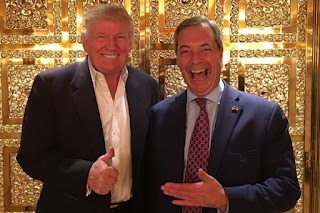'Because
things don’t appear to be the known thing; they aren’t what they
seemed to be neither will they become what they might appear to
become.'
Posted by Tessa den Uyl and Martin Cohen
 |
| The UK Prime Minster, Mrs May, signing the Article 50 notification |
March 29th 2017 was the date that the United Kingdom, in the form of its Prime Minister, Teresa May, formally notified the European Union, by letter, of its intention to leave.
The UK is split down the middle by the plan, with a fraction over half voting 'for' and just under half voting 'against'. But within the ruling Conservatives, a resurgent nationalism and indeed triumphalism dominates.
And this is what first stands out about this carefully prepared and balanced image. The very dominant ‘Union Jack’. Now British politicians do not usually cloak themselves in the national flag—it used to be considered inappropriate, a usurpation. The flag has also been for too long associated with 'unacceptable' political parties, like the National Front, who stood for Parliament (and fought in the streets) on an openly racist platform about expelling 'other races' from the country.
But now a Prime Minster with a very similar platform, expelling European ‘migrants’ from the country, involving a backward-looking and divisive notion of Britishness, is actually in power.
So the Union Jack is there, on Mrs May's left, carefully arranged to display the red English cross to good effect. And on her right is … an empty chair, conveying a sense of isolation. Above the Prime Minster is not Big Ben, but a small, wind-up, carriage clock. Such things are anachronisms in an age of digital timepieces. They need winding regularly and are much less accurate. Here, the clock looks sad, and conveys only the impression of monotonous, dusty waiting rooms …
Mrs May sits exactly in front of a marble fireplace. Marble sends subliminal messages about wealth and importance. But it is also the stone of cemeteries and mausoleums.
The British Prime Minster wears a black outfit, which despite the white speckles does not quite manage to dispel the funeral feel. Mrs May used to be a banker, working at the Bank of England and the Association for Clearing Payment Services. But here she looks less like a banker and more like a lawyer, signing a Very Important Document, such as a death certificate.
And so in a sense it may actually turn out to be—for her Brexit programme could be the death of the United Kingdom.

